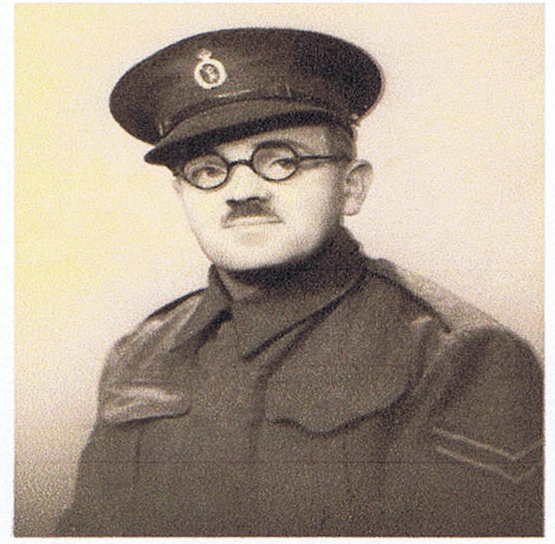Cpl. William George Bamforth
British Army 14th Line Section, No.2 Coy Royal Corps of Signals
from:Hadfield, Derbyshire
In May 1939 my father, William Bamforth, joined the local Territorial Army, 14th Line Section, 2nd North Midland Group, Royal Corps of Signals. On Sunday morning 3rd of September 1939, I came down to breakfast only to find that my dad was not there. Mum told me that he had been called at 5am to the TA camp in Glossop. He came home during the week, but only to pick up some personal items. Later that week, together with my Mum and several hundred other people, we watched the Royal Signals march to the market square and there load up onto army trucks. At that time we were not, could not be told were they were going. In point of fact they went first to Bakewell and then a few weeks later on to Chesterfield where they joined with other units. We did not hear from my Dad for some time and eventually we received his limited address: Cpl. Bamforth, WG, 14th Line Section, No 2 Company, 2nd Air Formation Signals, Advanced, Air Strike Force, British Expeditionary Force. Somewhere in France.
The next time I saw my Dad was quite a surprise. During the week I was living with my Maternal Grandparents, one street away from home as my Mum was working in a local cotton mill, engaged in some sort of war work. On the Sunday I went home and there was my Dad, sitting at the table, on leave from France. My birthday had just passed but he had a present for me, Dinky Toy Aeroplanes, one box of British and one box of French, six aircraft to a box. He had returned to France before Christmas, but “Father Christmas” had brought me a box of Dinky Army trucks – one search light lorry with anti-aircraft gun, one covered lorry towing a field kitchen and water bowser, one Dragon bren gun carrier towing an ammunition cart and a field gun. I also got a French howitzer which actually fired shells, propelled by a spring. Christmas day saw Mum and me with my paternal Grandparents and we all listened to Gracie Fields 'Somewhere in France' and we were all hoping that my Dad was in that audience.
In the New Year letters were sparse, and when we heard the news that the Germans had attacked we received even less, in fact none at all for several weeks. I was only 6 years old but everyone knew about Dunkirk and there was no news of my Dad. My Granddad Farrell, mum's dad, used to cheer me up by saying that “no news is good news”. It was obviously a terrible time for my mother, but I cannot remember her being a crying wreck and my memory of those days is clear.
In June, Mum received a notification that my dad was in a military hospital in Basingstoke, he had been in hospital in Plymouth and it was hoped that he would soon be moved to a military hospital nearer our home. He was, to Wharncliffe (Temporary) Military Hospital in Sheffield.
Eventually we learned that my Dad had been on the Lancastria, sunk by German bombs at St Nazaire on the 17th of June 1940. There had been over 6000 aboard, British, French and Belgian Military, as well as British Fairey Avaition workers and their families who had been employed by Fairey Aviation in Belgium. It was the greatest British Maritime disaster, in excess of 4250 lives were lost that day.
My father's AB64
Dad was discharged from the Army in December 1940 as medically unfit. He had not recovered from the injuries received when the Lancastria was sunk. He received a lapel badge, which had been instituted by King George VI, the badge showed the cypher of the king and the words around the perimeter read “For Loyal Service”. I believe this badge was to show that the wearer was not a shirker who was ducking serving his country.
Once he could, Dad returned to work, he joined the ARP and the British Legion. My mum also returned to work in the mill, she was also a Fire Watcher. She didn't watch fires, but was on the look out for incendiary bombs – fire bombs.

